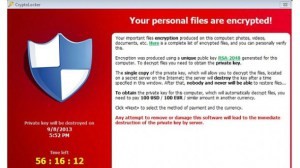
The internet is an invaluable tool for business, but it comes with its share of risks. Every year, the war between hackers and the internet security industry heats up, with millions of end-users’ data at stake.
Recently the hackers got a bit of a leg up with programs known as “Ransomware.” As you might expect from the name, Ransomware locks up your data, then holds it hostage until you “ransom” it by paying the hackers. If a worm like Cryptolocker or Reveton gets into your system, it can all but destroy your data.
Following the tips below will go a long way towards keeping your data secure:
- Make sure that programs on your PC are properly updated. Many viruses and worms rely on exploiting weaknesses in old versions of common programs like Adobe Acrobat, Java, or Flash. Ensuring that those programs are kept up-to-date is key.
- Use an antivirus program. Always ensure that your chosen antivirus is up to date, and that you scan your network regularly. This will help you detect risks before they become entirely destructive.
- Never open attachments or links in emails unless you explicitly trust the person sending you the email. Even then, you should be sure that the link or attachment makes sense-ask yourself “why did this person send me this email?”
If you suspect it might be spam, do not open the links/attachments. - Always have backups. Make sure that your backups are not stored on at-risk computers, nor connected to at-risk computers for extended periods of time. By regularly backing up, you minimize the damage any virus or hacker can cause.
- Maintain secure passwords. A strong password goes a long way to keeping your data secure, but if you aren’t careful, hackers can guess your password. Always try to use non-obvious passwords (“1234” will not suffice!) and never use the same password for different services.
These steps, while somewhat obvious, are crucial in preventing the catastrophic loss of data that programs such as Cryptolocker can incur. Ransomware programs are likely to become more and more common in the future, so take the end of the year to ensure your security is up-to-date!
